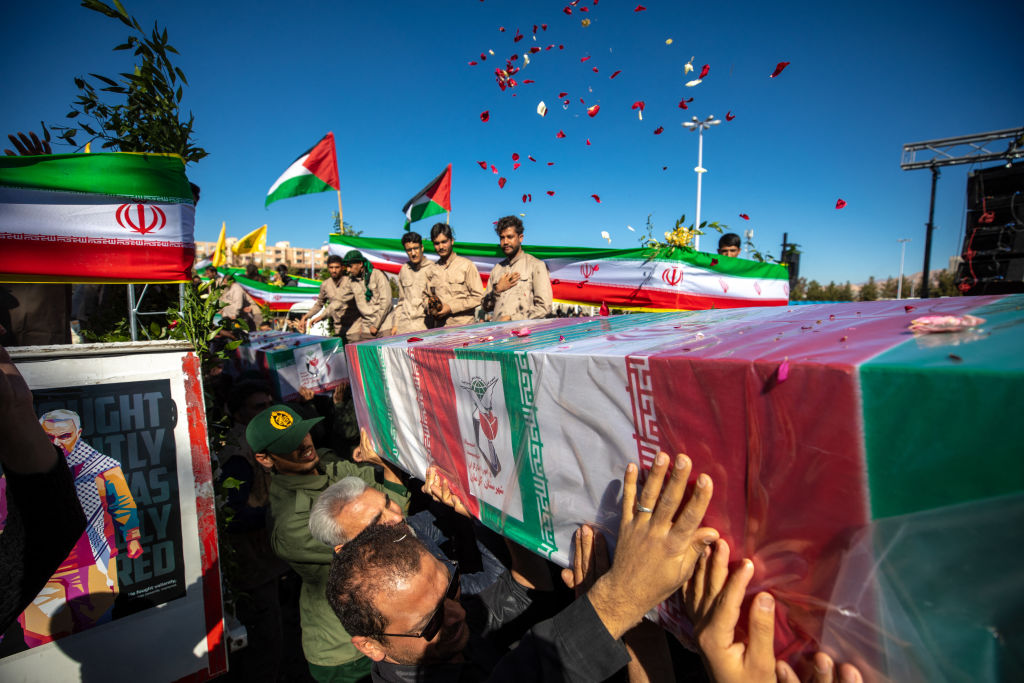Two suicide bombs killed nearly 100 people and wounded many more in the Iranian province of Kerman on 3 January, as Iranians gathered to commemorate the anniversary of the assassination of IRGC commander Qasem Soleimani. It was the most devastating terrorist attack to hit Iran in many years.
Iranians are questioning why Soleimani’s family and the IRGC leadership missed their flight to Kerman, and so did not attend the commemoration
There is little agreement in Iran over who was ultimately culpable for the attack. Opinions have sharply divided along political lines. The government quickly blamed the United States and Israel, suggesting the attack was an Israeli attempt to draw Iran into a wider regional conflict.
As observers had suspected, the attacks were eventually claimed by Islamic State’s Afghanistan branch, Isis-Khorasan. The group has carried out attacks in Iran before, in Shiraz and against the Iranian parliament. Yet even after Isis-K said it was responsible for the 3 January attack, the Iranian regime doubled down and insisted that Isis-Khorasan were enabled by the US and Israel. This is not quite the ideological contortion it seems, given the regime believes Isis is a creation of the United States.
But wider Iranian society remains sceptical, questioning why Soleimani’s family and the IRGC leadership missed their flight to Kerman, and so did not attend the commemoration. Others have argued that if the government wasn’t behind the attacks it must have at least known about them.
The Iranian government has not helped to dampen down this kind of speculation. This week, the authorities claimed Isis had planned to detonate some 64 bombs on 3 January, and the regime had prevented all but two of the explosions. The regime clearly wants people to believe that its security services are in control. But for most people their dramatic claims raise more questions than answers.
The official investigation into the attack hasn’t helped with Iranians’ scepticism either. In the space of 24 hours it had managed to uncover the terrorist network and arrested at least one individual of Tajik descent. While the regime would like to think this demonstrates its mastery of the security environment, many Iranians believe it just demonstrates the regime knew about the attack beforehand.
For Iranians, this is not a government in control, carefully weighing up its next steps, as some in the West would like to portray it as. It is instead a government navigating an increasingly delicate regional situation with a population that is largely unsupportive. (It is worth noting that in contrast to many western countries, the Iranian regime has struggled to rally the people behind the Palestinian cause since Hamas’s attack in October.)
Rhetoric and reality are, as always in Iran, clashing. The more sober members of the hard-line establishment are finding the enthusiastic belligerence of some of their colleagues wearing. When an IRGC commander inadvertently took credit for the attacks on Israel on the 7 October, he was roundly criticised and swiftly corrected. Khamenei understands that with a succession looming and the population restless, the last thing Iran needs is an open confrontation with the United States.
Yet the regime’s penchant for florid rhetoric may still come back to bite it. Iran’s proxies are becoming frustrated that the regime is not delivering on its belligerent rhetoric – both Hamas and the Houthis have expressed disappointment in its lacklustre response to Israel.
Meanwhile, more moderate Arab states are becoming increasingly anxious about Iran’s grandstanding. The much vaunted Iran-Saudi détente has now stalled, with the Saudis refusing to issue a licence for Iranian pilgrimage flights to Mecca. And Jordan has launched four strikes against Iranian linked drug smuggling networks in Syria.
On both the domestic and international stage it seems like Iran’s recklessness is finally catching up with it.







Comments